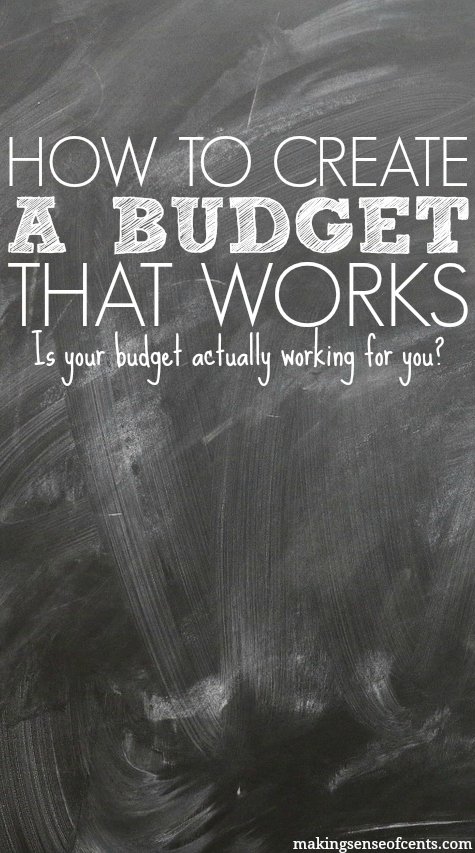Are you interested in creating a budget?
 The average family carries a lot of financial stress. Most people have student loans, credit card debt, a mortgage, car loans, and sometimes even other forms of debt.
The average family carries a lot of financial stress. Most people have student loans, credit card debt, a mortgage, car loans, and sometimes even other forms of debt.
However, not many people have a budget.
According to a survey done by Gallup, 68% of households in the U.S. do not prepare a budget.
I believe budgets are extremely important and nearly everyone should have one. Rich, poor, middle-class, whatever you are, a budget will likely help improve your financial situation.
Some people think budgets are only for people living paycheck to paycheck, or those with no money.
WRONG!
Budgets are for everyone.
Yes, that means no matter how much money you make, you should probably have a budget. I recently read something that said couples who make $50,000 a month, on average, only save 4% of their income. FOUR PERCENT on a $50,000 monthly income? The majority of that monthly income went towards clothing, food, cars, and homes. I can’t even imagine how someone could blow through so much money each month.
This just proves my point, more people need a budget.
Budgeting may not be the most fun thing in the world, but it needs to be done. Budgeting can help you take control of your financial life, which can help reduce stress and let you reach your dreams.
Other budgeting-related articles you need to read:
- A Cash Budget May Be The Diet You Need
- How I Manage My Finances So I Can Save Time and Worry Less
- The Ultimate Emergency Fund Guide
- Why You Should Pay Yourself First
- How To Save Money – My Best Money Saving Tips
- 14 Best Books About Budgeting
Below are my tips on how to make a budget and creating a budget.
The positives of creating a budget.
Budgets help people manage their money better. It’s that simple.
Budgets are great, because they keep you mindful of your income and expenses. With a monthly budget, you will know exactly how much you can spend in a category each month, how much you have to work with, what spending areas need to be evaluated, among other things.
Budgets have helped people reach their goals, pay off debt, make more money, retire, and more.
Should a budget be electronic or on a piece of paper?
Everyone has a preference, so this depends on what will work best for you.
Pencil and paper can be great, but an electronic version (such as a spreadsheet, Mint, or Personal Capital) can help you easily make changes.
I suggest choosing whatever you are most comfortable with. It doesn’t matter how you keep your budget; it’s just important that you stick to it.
Side note: I recommend you check out Personal Capital. Personal Capital is similar to Mint.com, but much better. Personal Capital allows you to aggregate your financial accounts to easily see your financial situation. You can connect accounts; such as, your mortgage, bank accounts, credit card accounts, investment accounts, retirement accounts, and more. And it’s FREE.
You MUST track your income and spending.
What you want is to create a realistic budget. To show you where your money is coming from and where it is going, you need to gather all of your receipts, bank and credit card transactions, and so on.
Or, you could even take it a step further by tracking everything for the next month or two, this way you know you’re not missing any expenses. This means recording every single transaction with a note that tells you exactly what you bought (if a receipt is not itemized). Then, at the end of the month, you can evaluate your spending.
After one month of closely tracking your spending, I’m sure you’ll be shocked by your results. This is the best way to create a realistic budget, as you will truly see where your money is going, and this will help show you how much should be dedicated towards each category in your budget.
Plus, the shock from seeing exactly where your money is going will encourage you to be wiser with your spending.
Budget category: Income.
For the income part of your budget, it can be from varying sources. You can include income from your day job, rental properties, side jobs, passive income sources, and so on.
One common mistake is that many don’t realize their income can drastically fluctuate from month to month, even when you work the same hours every month or if you are paid salary. Due to this, you will want to be mindful of whether you are paid twice a month, every two weeks, once a week, etc. The difference of when you are paid can change the amount you make each month. Budgeting with a fluctuating income can be difficult, and in a future blog post I will go over it in more detail.
Also, I don’t think bonuses should be included in a person’s budget. Including them in your budget is not usually the best thing to do unless you are 100% certain you are receiving the bonus. I have heard of far too many people who have counted on bonuses only to be let down when it was less than anticipated. Your budget should be realistic, not a fairytale.
Related:
- 75+ Ways To Make Extra Money
- 10 Things I’ve Done To Make Extra Money
- Ways To Make An Extra $1,000 A Month
- The Ultimate Guide To Extra Income
Budget category: Expenses.
Have you ever truly totaled your expenses?
When making a budget, many people only estimate their expenses. However, you actually should be taking your realistic expenses and putting them in your budget as your estimations may be way off.
Here are expenses you may include when creating a budget:
- Home – House payment, rent, maintenance, utilities, insurance, property taxes, etc.
- Car – This includes all car expenses such as your monthly car payment, gas, maintenance, insurance, license plate fees, and so on.
- Television, cable, Netflix, Hulu, etc.
- Cell phone.
- Internet.
- Food – This includes all groceries, eating out, snacks, etc. Seriously, sit down one day and add up your food expenses for the month before.
- Clothing.
- Entertainment – Entertainment can include many things, such as going to the movies, going out for drinks, concert tickets, sports, and so on.
- Charity – If you regularly donate to charity, then this should be an area you budget for.
- Savings funds – This can be for your retirement fund, wedding, travel, etc.
- Taxes – If you are self-employed, then taxes will make up a large part of your budget.
- Health insurance.
- Miscellaneous – Pet expenses, fees, childcare, school, gifts, etc.
Related posts on creating a budget:
Keep your loved ones involved when creating a budget.
Even if only one person manages the family’s finances, the other person in the relationship should, at least, have somewhat of a clue. Conducting regular family money meetings is crucial to having a successful budget and meeting financial goals.
A budget doesn’t work if the other person doesn’t even know it exists!
Make changes when/if needed when creating a budget.
I recommend going over your budget on a regular basis. This may mean once a week, once a month, or something else. Do what feels right for you and what you think your situation calls for.
Many things can change in your budget. Your income may change, your expenses may change, or your goals may change. When something changes, you should adjust your budget to reflect that.
You may have noticed a recurring theme in this budget post, that you should be realistic about everything. Be realistic about what you make, what you spend, and if things need to be changed.
Do you believe in the power of creating a budget? Why or why not?


Leave a Reply
Thanks for this valuable piece, Michelle.
This is exactly what I need this year, 2019.
I remember I created a budget in 2017 and tracked my income and expenses for a couple of money and that helped me to save a ton of cash but how I totally fling the idea into the air in 2018 after my income has gone up is what I can understand. Maybe I used to think that budgeting is for people with very low income. Now I know better.
I’m going to go back to my drawing table this time.
Thanks for sharing.
Emenike
Thanks for sharing such comprehensive guide on budgeting! I did create one last time but find it difficult to maintain and update it regularly. Guess it’s time to re-create a new one again. That’s the only way I find it effective to save more money.
I have always failed in managing budget. Your points boost highly. Thank you. Shall try this time if I can manage.
I know this is an old post, but I generally agree with everyone needing a budget. However, a lot of people find creating budgets dry and boring. In the last few years, there’s been a lot of financial aggregate apps that help in the budgeting process.
Simplification is key. If we can get everyone to save more money coming in versus going out – that will be a big win already.